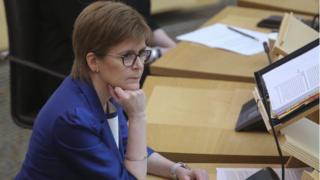Coronavirus: Nicola Sturgeon warns Scots not to meet up indoors
 Image copyright
Getty Images
Image copyright
Getty Images
Nicola Sturgeon has warned people that meeting up with other households indoors is a "surefire way" of allowing coronavirus to spread.
The current restrictions allow people from two households to meet outdoors in small groups of no more than eight.
With wet weather forecast for the weekend, the first minister warned that gatherings should not move indoors.
She said Scotland was "going in the right direction" but said she could not overstate how "fragile" progress was.
The Scottish government's latest estimate of the reproduction rate - the "R number" - measure of the spread of the virus is between 0.7 and 0.9.
This is a slight change from the previous estimate of between 0.7 and 1, and Ms Sturgeon said it "shows how easy it would be for the virus to run out of control again".
There are estimated to be between 7,000 and 17,000 infectious people in Scotland - an estimate which has been falling in recent weeks, and which is expected to continue falling over the next fortnight.
Lockdown restrictions in Scotland were eased slightly at the end of May, with people now allowed to meet one other household in outdoor settings such as parks or gardens.
Groups are not meant to exceed eight people or come within 2m (6ft) of each other, and police dispersed more than 2,000 gatherings over last weekend amid sunny conditions.
With wetter weather forecast over the coming days, Ms Sturgeon stressed that the rules must still be obeyed.
She said: "Ahead of a weekend when the weather forecast is more traditionally Scottish - i.e. heavy rain - I want to particularly emphasise that you cannot and must not meet people from another household indoors.
"That is a surefire way of allowing this virus to spread again.
"Unless you're willing to get your waterproofs on and meet outdoors, don't meet up at all - I cannot emphasise that strongly enough."
Ms Sturgeon also said she would "strongly encourage people" to wear face coverings in shops, but was still considering whether to make it mandatory.
She added: "I said when I announced the policy some weeks back that we would keep this under review.
"We haven't reached a final position on this but I think it is fair to say it is something that we are considering."
The latest estimate of the "R number" is based on modelling from before restrictions were eased, and Ms Sturgeon said it would need to be monitored closely over the coming weeks.
The number of people in hospital with Covid-19 continues to fall, and Thursday marked the first weekday since March where the daily death tally reported by the first minister was in single figures.
She said progress was being made, but said "I can't stress enough how fragile it is".
Ms Sturgeon said the fact the fact there had only been a slight change in the estimate of the infection rate "shows you how easy it would be for the virus to run out of control again".
She added: "I want people to have a sense of hope and optimism, but even in areas where you're seeing no new cases reported, do not allow that to become complacency. The virus is still out there."
Meanwhile the Scottish government has published a new framework for getting cancer surgery services back up and running.
Health Secretary Jeane Freeman said the focus was on making sure patients across the country get the same level of priority, and that people are offered "the earliest possible appointment" for surgery.
She added: "That appointment may be outside their local board area, but that's to be able to allow us to ensure that prioritisation is the same across the country, no matter where patients live, and that they're given the earliest possible opportunity."
Ms Freeman said there may need to be regional or national working between health boards, and she would be writing to board chief executives to make that clear.
The Scottish government has also established two groups on cancer, the national cancer recovery group - which will provide "strategic national oversight" of cancer services - and the national cancer treatments group, which will be tasked with ensuring the surgical prioritisation of services.